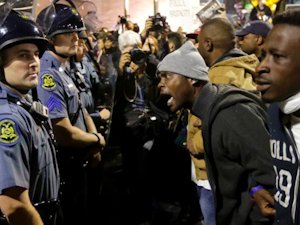
The Candidates 2016 and Civil Rights
Civil Rights tend to be the most contentious and hotly debated topics in politics. Whether we're talking about gun rights, marriage rights, privacy rights, or any of a number of other things we believe we are entitled to, the concept of what is and is not a "right" gets muddled. I tend to believe that, if it's something being given to you, it's not a right. A right is something you have just for being born, and the only way the law can intervene is by repressing your rights, not granting them to you. It is important that our natural rights be protected from bad actors, which is in my opinion the whole purpose of government, but no legal statute or regulatory framework is going to give you a right. Part of being a responsible American citizen is in defending your rights from those who would take them, and I would respect--if not vote for--any candidate who understands that basic, constitutional principle.
Law Enforcement
 | | Whatever we're doing right now, it's not working |
It would be easy for me, as a relatively well-off middle American living in a comfortable suburb of St. Louis, to argue that there is no law enforcement crisis as far as I can see. However, I am unwilling to be so naive and willfully blind, especially as, with just a little extra vision, I can see Ferguson on the other side of the city. There is certainly a problem, and I think it stems from this country's overall modern approach to law enforcement, which emphasizes unrealistic arrest quotas over actual safety, militarization over community outreach, property seizure over public service, and more. To be clear, I don't blame actual police officers for any of this--they put their lives on the line every day for a weak paycheck and very little appreciation--but I do blame those in higher positions of authority. The pathological obsession with prosecutions has lead to very real police states in low-income communities throughout the country, and it's no wonder the people in those communities feel oppressed when there are police cruising around every block of their neighborhood with their bullet-proof windows up, just waiting to pounce on any infraction, all in the name of a demonstrably failed "broken windows" philosophy. My ideal presidential candidate would address the root cause of the problem rather than just the symptoms, would use the bully pulpit to encourage a paradigm shift in the way states enforce their laws. We need to do away with funding only those precincts that have high prosecution numbers; we need to scale down the use of military equipment on US streets; we need to stop relying on S.W.A.T. for petty drug offenses; we need to emphasize interfacing with the community instead of patrolling it; we need to crack down on abuses of property seizure; and we need to weed out even the vaguest hints of racism wherever we find them. Only then can the healing begin.
Hillary Clinton has a robust outline on criminal justice reform on her website. She proposes to increase funding to the U.S. Department of Justice, specifically towards the "collaborative reform" program and the "pattern or practice" program. She also wants to provide matching funds to every state to make body cameras available for all officers, to support legislation that would crack down on racial profiling, and to limit the transfer of military equipment to local law enforcement. Additionally, she wants to reduce mandatory minimum sentences for nonviolent drug offenses and focus federal resources on violent crime instead of nonviolent drug enforcement.
Arguing that "too many unnecessary laws" are the root of the problem, Gary Johnson would end the War on Drugs, remove mandatory minimum sentences, and take "steps toward meaningful criminal justice reform." He has also remarked, "I abhor the government spending money on programs that show no improvement in our lives and criminalize actions that do not warrant criminalization."
Jill Stein wants to establish a "Truth and Reconciliation Commission" that would "understand and eliminate the legacy of slavery," which she cites as the core problem. She would also establish "police review boards and full time investigators to look into all cases of death in police custody." She defines "capitalism" as "racism, militarism, and extreme militarism," and aims to change that by reducing funding to prisons, eliminating mandatory minimums, ending the use of SWAT teams for drug offenses, demilitarizing the police, and ending the War on Drugs.
Declaring himself "the law and order candidate," Donald Trump has argued that "progress against criminal activity is being reversed by this administration's rollback and discouragement of criminal enforcement." He has called for an expansion of New York's stop and frisk law, and is vehement in arguing that the police are mistreated and require more support and power.
I could live with either Clinton or Johnson when it comes to criminal justice reform. I am not particularly fond of Clinton's idea to increase funding to bureaucratic committees, but I see little wrong with funding body cameras. I think Johnson is more correct in identifying the root problem, but at least he and Clinton are on the same page when it comes to mandatory minimums and nonviolent drug offenses. Stein is also on that page, but she is way off the mark when she argues that "the legacy of slavery" and "capitalism" are the core problems that need to be addressed; those fights would rip this country apart at the seams, not bring it together. As for Trump, I think he'd also take us even further down this divisive road we're on and exacerbate the problem, albeit in the opposite direction as Stein. Therefore, I'll give Clinton and Johnson points, because I think they more accurately see what the problem is, but not Stein or Trump, because they'd only make things worse.
Gun Control
 | | Stock photo courtesy of Google Image Search |
I've done a deep dive into the subject of gun control in America, and the short version of my modified beliefs is this: the gun control options being put forward would be largely ineffective in curbing gun violence, and preserving the Second Amendment is more important than trying to sacrifice freedom for the illusion of security. I do not oppose states that want to tinker with gun laws, but the federal government needs to stay out of it. I'm not a card-carrying member of the NRA, nor do I believe the government is trying to steal our guns. However, I have yet to see a gun control suggestion that simultaneously meets the requirements of the Second Amendment and would demonstrably accomplish anything meaningful. It's ultimately much ado about nothing, but on principle, I would hope my ideal candidate would respect the rights of Americans to keep and bear guns.
Opting to call it "gun violence prevention," Clinton proposes an expansion to background checks that includes closing alleged loopholes and removing legal protections on gun manufacturers. She would also support laws designed to punish anyone who intentionally buys a firearm for someone who cannot legally buy one, to preventing anyone with severe mental illness from purchasing a gun, and to "keep military-style weapons off our streets."
Johnson believes that "responsible adults should be free to...arm themselves if they want." Though he has shown no interest in increasing legal restrictions on gun ownership (even going so far as to call all gun laws "ineffective"), he also doesn't believe in "rolling back" any existing firearm laws. Deferring to his running mate, he has offered a "thousand-person taskforce" to study the issue of how to get firearms out of the hands of potential terrorists and the mentally ill, though he is skeptical that there are any potential laws that can reduce gun violence without sacrificing individual freedom.
For her part, Stein is calling for universal, FBI-centered background checks, closed loopholes, a new assault weapons ban, and mandatory psychological testing and training.
Though he is quite clear on his website that he believes enforcing the laws on the books and expanding treatment programs for the mentally ill will solve the majority of the problem, he also calls for an end to any and all gun and magazine bans, because "the government has no business dictating what types of firearms good, honest people are allowed to own." He doesn't want to expand background checks, instead believing that existing background checks are ineffective and need to be fixed before they can be expanded. He is calling for a national right to carry, and argues that the Second Amendment doesn't create the right to keep and bear arms but rather "ensures the government can't take it away."
The approaches of Clinton and Stein make me incredibly nervous. I'm not worried they'll take our guns away or any such nonsense, but I am worried about "removing legal protections" and requiring "mandatory psychological testing and training" by the government. Sounds a bit too Nineteen-Eighty-Four to me. I can see both proposals giving too much power to government, but I can't see either one actually succeeding in solving anything. I'm also skeptical of Johnson's squishy take on the issue and Weld's silly taskforce idea, though his support of the Second Amendment seems relatively clear. Trump might be taking it a bit too far by trying to end all gun and magazine bans, but I think he's absolutely right about fixing the existing background check systems before we can even begin to talk about expanding them. I'll give both him and Johnson points, but I don't think either man gets it exactly right.
-e. magill 9/22/2016
|
|